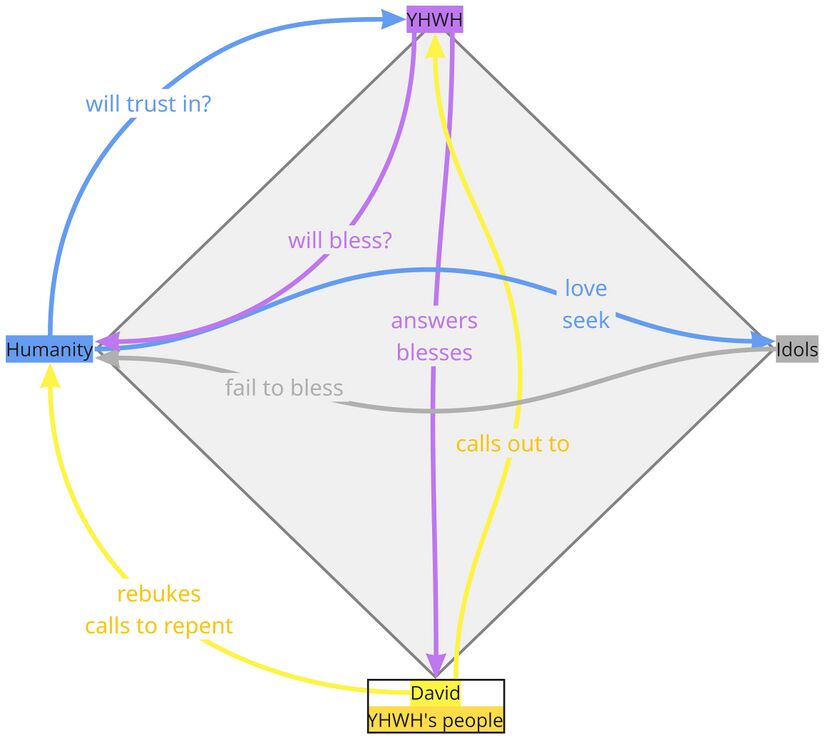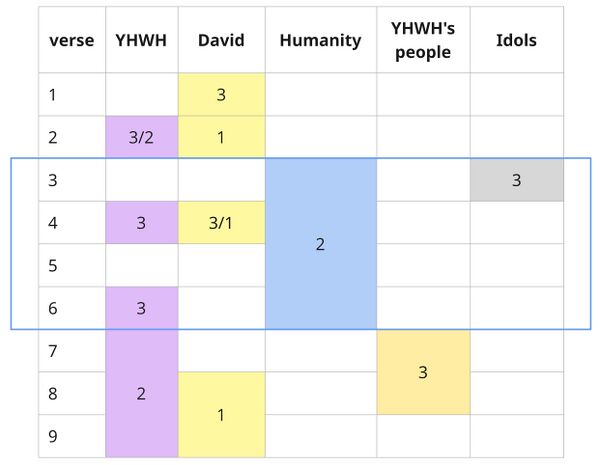Psalm 4 Participant Analysis
From Psalms: Layer by Layer
Psalm 4/Participant Analysis
Choose a PsalmNavigate Psalm 4
Participant Analysis
Participant Analysis focuses on the characters in the psalm and asks, “Who are the main participants (or characters) in this psalm, and what are they saying or doing? It is often helpful for understanding literary structure, speaker identification, etc.
For a detailed explanation of our method, see the Participant Analysis Creator Guidelines.
There are 5 participants/characters in Psalm 4:
Profile List
| David |
| "David" (v. 1) |
| "loyal one" (v. 4) |
| YHWH |
| "YHWH" (vv. 4, 6, 7, 9) |
| "God of my prosperity" (v. 2) |
| YHWH's people |
| Humanity |
| "Mortal humans" (v. 3) |
| "many" (v. 7) |
| Idols |
| "Vanity" (v. 3) |
| "Falsehood" (v. 3) |
Profile Notes
- David is the king and representative of YHWH's people. Because he is YHWH's "loyal one" (v. 4), YHWH listens to him when he calls out (vv. 2, 4) and blesses him (vv. 2, 7–9).
- YHWH is "the God who makes things right" for David (v. 2). He has set apart his people and his king for special treatment (v. 4), and so the light of his face is like a banner over them (v. 7), signaling to all people what true blessing looks like and inviting them to participate (cf. vv. 3–6).
- YHWH's people are those who are loyal to him (v. 4) and thus experience his favor and blessing—"the light of his face" manifested in an abundance of grain and new wine (vv. 7–8).
- About half of the psalm is addressed to humanity, referred to as "mortal humans" or "human beings" (v. 3). These are people (whether Israelites or non-Israelites) who seek blessing from gods other than YHWH (vv. 3, 7). David summons them to repent and trust in YHWH for true blessing.
- Lurking in the background of this psalm are idols, or gods that people worship other than YHWH. The psalmist derisively calls these idols "what is vain" and "what is false" (see notes on lexical semantics).
| Hebrew | Verse | English |
|---|---|---|
| לַמְנַצֵּ֥חַ בִּנְגִינ֗וֹת מִזְמ֥וֹר לְדָוִֽד׃ | 1 | For the director. With stringed instruments. A psalm. By David. |
| בְּקָרְאִ֡י עָנָנִי ׀ אֱלֹ֘הֵ֤י צִדְקִ֗י | 2a | When I called out, the God of my prosperity answered me. |
| בַּ֭צָּר הִרְחַ֣בְתָּ לִּ֑י | 2b | In the distress, you granted me relief. |
| חַנַּנִי וְשָׁמַע תְּפִלָּתִֽי׃ | 2c | He was merciful to me and heard my prayer. |
| בְּנֵ֥י אִ֡ישׁ עַד־מֶ֬ה כִבְדֵי לֵב | 3a | Mortal humans, how long [will you be] stubborn? |
| לָמָּה תֶּאֱהָב֣וּן רִ֑יק תְּבַקְשׁ֖וּ כָזָ֣ב סֶֽלָה׃ | 3b | Why would you love vanity, seek falsehood? Selah. |
| וּדְע֗וּ כִּֽי־הִפְלָ֣ה יְ֭הוָה חָסִ֣יד ל֑וֹ | 4a | But knowthat YHWH has set apart one who is loyal to him. |
| יְהוָ֥ה יִ֝שְׁמַ֗ע בְּקָרְאִ֥י אֵלָֽיו׃ | 4b | YHWH hears when I call out to him. |
| רִגְז֗וּ וְֽאַל־תֶּ֫חֱטָ֥אוּ | 5a | Trembleand do not sin! |
| אִמְר֣וּ בִ֭לְבַבְכֶם עַֽל־מִשְׁכַּבְכֶ֗ם וְדֹ֣מּוּ סֶֽלָה׃ | 5b | Think to yourselves on your beds and lament! Selah. |
| זִבְח֥וּ זִבְחֵי־צֶ֑דֶק | 6a | Sacrificeright sacrifices |
| וּ֝בִטְח֗וּ אֶל־יְהוָֽה׃ | 6b | and trust in YHWH! |
| רַבִּ֥ים אֹמְרִים֮ מִֽי־יַרְאֵ֪נ֫וּ ט֥וֹב | 7a | Many are saying,"Who will show us something good? |
| נְסֵה־עָ֭לֵינוּ א֨וֹר פָּנֶ֬יךָ יְהוָֽה׃ | 7b | Cause the light of your face to shine on us, YHWH!" |
| נָתַ֣תָּה שִׂמְחָ֣ה בְלִבִּ֑י | 8a | You have put joy inmy heart |
| מֵעֵ֬ת דְּגָנָ֖ם וְתִֽירוֹשָׁ֣ם רָֽבּוּ׃ | 8b | since the time their grain and their new wine multiplied. |
| בְּשָׁל֣וֹם יַחְדָּו֮ אֶשְׁכְּבָ֪ה וְאִ֫ישָׁ֥ן | 9a | In peace, I can both lie downand fall asleep, |
| כִּֽי־אַתָּ֣ה יְהוָ֣ה לְבָדָ֑ד | 9b | because you alone, YHWH, |
| לָ֝בֶ֗טַח תּוֹשִׁיבֵֽנִי׃ | 9c | make me dwell securely. |
- v. 3: It is possible that YHWH is the speaker of v. 3. The vocative "mortal humans" or "human beings" (בְּנֵי אִישׁ) might imply a divine speaker.
- v. 4: The phrase "one who is loyal to him" refers primarily to David, the king (cf. the "I" in the parallel line), and, through him, to all of YHWH's people—everyone who rejects idolatry (v. 3) and is loyal to him. (The rest of the psalm makes clear that YHWH's people [and not David only] are set apart for special treatment [see vv. 7–8]).
- vv. 7–8: There are multiple participant-related ambiguities in vv. 7–8.
- Who are the "many" in v. 7a? It is possible that the "many" are to be identified with the "mortal humans" addressed in vv. 3–6. The speech of the "many" in v. 7a—"who will show us something good?"—would be entirely consistent with the attitude of the "mortal humans" described in v. 3. As Wilson writes, "This question reveals a rather crass pragmatism that led at the beginning of this psalm [see v. 3] to the callous disregard of covenant obligations and the pursuit of false hopes among the fertility deities."[1] But v. 7b—"the light of your face is made a banner over us, YHWH" or "lift up the light of your face on us, YHWH"—implies trust in YHWH. If v. 7b is part of the speech, then the "many" should be identified with people who trust in YHWH. Thus, the identification of the "many" largely depends on the extent of the speech. If, as we argue, the speech continues through the end of v. 7, then the "many" refer to YHWH's people and the question in v. 7a is rhetorical. It could either express an intense desire for good, a wish,[2] or it could be a liturgical question to which v. 7b gives the response: "Who shows us good? (YHWH does!) The light of your face, YHWH..." (cf. Ps 24:8, 10).
- Who is speaking in v. 7b? Verse 7b is either the psalmist’s own words in response to the "many" (e.g., NIV, NET, CEV, JPS85, NJB, NLT, LUT, NGÜ, TOB, BDS, S21, RVR95, NVI, DHH94I),[3] or a continuation of the speech of the "many" begun in v. 7a (e.g., NRSV, REB, ESV, GNT, HFA, GNB, PDV2017, NFC). The parallelism suggests that v. 7a and v. 7b come from the same speaker. As Goldingay writes, "Both cola refer to ‘we’ and it is natural with NRSV to read the whole verse as referring to the same ‘we’; it is the transition to verse 8 that marks the transition from ‘we’ to ‘I’. Hypothesising a transition to the suppliant’s words within verse 7 works against the poetry."[4] Furthermore, when direct speech is introduced and begun in the a-line of a couplet, it usually continues into the b-line (e.g., Pss 2:7; 10:6, 11; 12:5; 16:2; 38:17; 39:2; 40:8; 41:5; 42:10; 50:16; 53:2?; 55:7; 58:12; 66:3; 68:23; 71:11; 73:11; 77:11; 82:6; 83:5, 13; 87:5; 89:3; 91:2; 94:7; 102:25; 105:11; 139:11; 140:7?; exceptions: Pss 13:5; 14:1?; 27:8; 31:23; 35:10?; 74:8; 79:10; 94:18; 96:10?).
- Whose grain and new wine multiplied (v. 8b)? The suffix "their" in v. 8b naturally refers to YHWH's people, the "many" described in v. 7.
Participant Relations Diagram
The relationships among the participants may be abstracted and summarized as follows:




